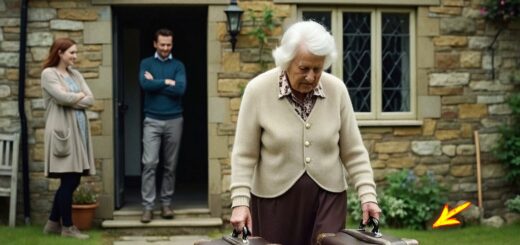He called me a financial liability and gave me 24 hours to leave his house…
So I heard, I replied, nodding toward the receptionist who was watching our exchange with professional neutrality. You seem quite concerned about my ability to manage my own affairs. James had the grace to look embarrassed, though I suspected it was more about being caught than about his actual behavior.
I just want to make sure you’re getting proper advice, he explained, lowering his voice and taking my elbow to guide me away from the desk. These inheritance situations can be complicated and you’ve never dealt with significant assets before. I gently but firmly removed my arm from his grasp.
I appreciate your concern, but as I told you on the phone, I have excellent professional advisors now. I don’t need your guidance. James’s expression hardened slightly.
Aunt Elle, be reasonable. You’re 65 years old and you’ve spent your life as a nurse suddenly managing significant assets. How do you know the assets are significant? I interrupted.
I never told you the amount Mrs. Blackwell left me. He faltered just for a moment. Well, you’ve rented a place.
You mentioned financial advisors. It’s obviously substantial. I’m just trying to protect you.
From whom, James? From the professionals Mrs. Blackwell herself selected to manage her estate? Or from myself? Do you truly believe I’m incapable of making sound decisions? Of course not. But experience matters in financial management. I deal with these issues professionally.
I could save you considerable fees by handling things myself. There it was. The real motivation.
Not concern for my welfare, but the opportunity to control my resources. To position himself as the gatekeeper to whatever Mrs. Blackwell had left me. James, I said, keeping my voice level.
Let me be absolutely clear. I neither want nor need your assistance with my financial affairs. My resources, whatever they may be, are mine to manage as I see fit.
Your involvement is not welcome. His face flushed. After everything I’ve done for you, this is how you repay me? By shutting me out completely? The sheer audacity of his claims stole my breath for a moment.
Everything he’d done for me? When had James ever done anything that didn’t ultimately serve his own interests? What exactly have you done for me, James? I asked quietly. Provided a guest house that you reclaimed the moment I no longer had income? Suggested I move to a senior facility where I could work for my room and board? Called me a financial lie. Liability to my face? That’s not fair, he protested, lowering his voice as several people glanced our way.
I was under a lot of pressure with the renovation timeline and Vanessa’s expectations. I always intended to help you find a suitable alternative. A suitable alternative, I repeated.
Like the den off your kitchen that you so generously offered after learning Mrs. Blackwell had left me something? James’s expression shifted. Calculation. Replacing indignation.
Look, we got off on the wrong foot with all this. Why don’t we go somewhere private and talk? We’re family, Aunt Elle. We shouldn’t be at odds like this.
Family. That word again, wielded when convenient, forgotten when not. No, James.
I’m not interested in another conversation where you attempt to manage, manipulate, or minimize me. Our relationship moving forward will be on my terms, not yours. Your terms? He looked genuinely confused, as if the concept of me setting conditions was incomprehensible.
Yes, my terms. Which begin with you respecting my independence and my boundaries. I am not a helpless old woman in need of your protection.
I am not a resource for you to control. I am a person, whole and complete in myself, who deserves basic respect. James stared at me as if seeing a stranger.
In some ways he was. The aunt he knew, the one who had subordinated her needs to his for decades, was gone, replaced by a woman who finally understood her own worth. I’d like you to leave now, I continued calmly.
And in the future, please don’t attempt to interfere with my legal or financial affairs. Any such efforts will be reported to the appropriate authorities as harassment. Harassment? James sputtered.
That’s ridiculous. I’m your nephew. Relation doesn’t confer rights, James.
Remember that. With those words, I turned and walked toward the building exit, where my car service was waiting. I didn’t look back to see James’s reaction.
I didn’t need to. For the first time in our relationship, his response didn’t dictate my emotions or actions. As the car pulled away from the curb, I felt a curious lightness, as if I’d set down a burden I’d carried so long, I’d forgotten its weight.
The confrontation with James hadn’t been comfortable, but it had been necessary. A public declaration of my independence, witnessed not just by James, but by myself. I was no longer the woman who would tolerate dismissal or manipulation in the year.
Name of family harmony. I was no longer defined by what I could give or how I could serve. I was Eleanor Wright, not aunt, not nurse, not caretaker, just Eleanor.
A woman of substance and worth, claiming her right to self-determination. And it felt, at long last, like coming home to myself. My confrontation with James in the law office lobby marked a turning point.
Having declared my independence, I now needed to secure it, not just emotionally, but legally and financially. The days that followed were filled with meetings as I systematically untangled my life from James’s influence and constructed protections around my new circumstances. The estate attorney Goldstein recommended, Victoria Chen, was a formidable woman in her 50s with a reputation for aggressive asset, protection strategies.
Her office, unlike Goldstein’s modern space, was housed in a converted Victorian mansion with dark woodwork and leather-bound law books lining the walls. Ms. Wright, she began after reviewing my situation, your case presents several interesting challenges. First, we need to revise your will immediately to reflect your current wishes.
Second, we should discuss trusts for any specific bequests you might want protected. Third, we need to address the property question, the house your nephew currently occupies. I nodded, feeling a curious mix of anxiety and resolve.
I’d like to start with the will. I no longer wish to leave everything to James. Victoria nodded, unsurprised.
Do you have alternative beneficiaries in mind? Other family members, friends, charitable organizations? The question gave me pause. After decades focused on James, I had few close relationships. Most of my friends were former colleagues with whom I’d lost touch after moving to James’s property.
My sister, James’s mother, had never resurfaced after abandoning him. I had no children of my own, no siblings, no extended family I maintained contact with. I’m not sure, I admitted.
Perhaps the Eleanor Blackwell Foundation? I’ve recently joined the board. A foundation is certainly a worthy beneficiary, Victoria agreed. But I’d suggest taking some time to consider this carefully.
Your circumstances have changed dramatically, and your estate planning should reflect not just your current situation, but your developing values and priorities. She was right, of course. I was still discovering what mattered to me, still exploring what kind of legacy I might want to leave.
For now, Victoria continued pragmatically, let’s draft an interim will that removes James as primary beneficiary and establishes the foundation as a temporary placeholder. You can revise it again once you’ve had more time to consider your options. The afternoon passed in detailed discussions of estate planning strategies I’d never imagined would be relevant to my life.
Generation skipping trusts, charitable remainder trusts, private foundations. By the end, my head was spinning. But I had signed a new will that reflected my current wishes and protected my assets from James’s potential claims.
Now, about the house, Victoria said, turning to the next item on her agenda. I’ve reviewed the documentation you provided. The situation is complex, but not hopeless.
She spread several documents across her desk, the original purchase agreement, mortgage statements, bank records showing my payments over the years. While the deed is in James’s name, we have clear evidence that you provided the entire down payment and all subsequent mortgage payments. Under the doctrine of resulting trust, we can make a strong case that you are the beneficial owner of the property, regardless of the name on the deed.
What does that mean exactly? I asked, trying to understand the legal terminology. It means that although the legal title is in James’s name, the equitable ownership, the right to the value of the property may still belong to you. The law recognizes that sometimes property is registered in one person’s name when it’s actually intended to benefit another.
I never intended to give James the house outright, I confirmed. He insisted the deed should be in his name for estate planning purposes. But the understanding was always that it was family property that I had paid for.
Victoria made a note. Did you have this understanding in writing? Any emails, letters, even text messages that confirm this arrangement? I thought back to those years. No written agreement.
It was family. I trusted him. The naivety of that trust was painfully clear now.
That makes it more challenging, but not impossible, Victoria said. The financial records tell a compelling story. At minimum, we can likely establish a claim for the value you contributed.
I don’t necessarily want to force James out of the house, I clarified, surprising myself with the realization as I spoke. I just want recognition, acknowledgement that the home he lives in, the foundation of his privileged life, came from my sacrifice. Victoria studied me thoughtfully.
This isn’t just about the money for you. No, I admitted. It’s about justice, about truth, about making visible what has been invisible for too long, my contribution, my worth.
She nodded, understanding. Then perhaps we approach this differently. Instead of immediately filing for a resulting trust, we prepare the case and then open negotiations.
The threat of legal action with the potential public exposure that would entail might be leverage enough to achieve the recognition you’re seeking. The word leverage resonated with me. For so long, I had been powerless in my relationship with James, constrained by my financial dependence and emotional investment.
Now, for the first time, I held genuine leverage, not just through Mrs. Blackwell’s inheritance, but through my willingness to speak truth and demand justice. I like that approach. I agreed.
Let’s prepare the case, but hold off on filing anything until we’ve attempted negotiation. Two weeks later, I sat across from James and his attorney in Victoria’s conference room. The atmosphere was tense, the pretense of family warmth completely abandoned…
























